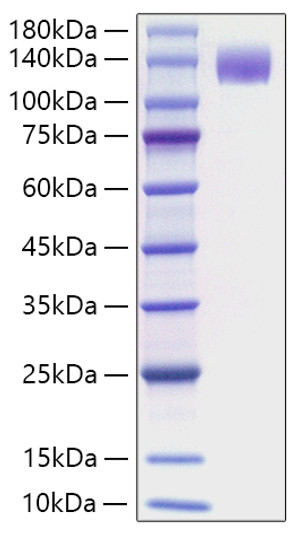| Post Translational Modifications | N-glycosylated, contains complex N-glycans with sialic acid. Autophosphorylated on several tyrosine residues in response to FLT3LG binding. FLT3LG binding also increases phosphorylation of mutant kinases that are constitutively activated. Dephosphorylated by PTPRJ/DEP-1, PTPN1, PTPN6/SHP-1, and to a lesser degree by PTPN12. Dephosphorylation is important for export from the endoplasmic reticulum and location at the cell membrane. Rapidly ubiquitinated by UBE2L6 and the E3 ubiquitin-protein ligase SIAH1 after autophosphorylation, leading to its proteasomal degradation. |
| Function | Tyrosine-protein kinase that acts as a cell-surface receptor for the cytokine FLT3LG and regulates differentiation, proliferation and survival of hematopoietic progenitor cells and of dendritic cells. Promotes phosphorylation of SHC1 and AKT1, and activation of the downstream effector MTOR. Promotes activation of RAS signaling and phosphorylation of downstream kinases, including MAPK1/ERK2 and/or MAPK3/ERK1. Promotes phosphorylation of FES, FER, PTPN6/SHP, PTPN11/SHP-2, PLCG1, and STAT5A and/or STAT5B. Activation of wild-type FLT3 causes only marginal activation of STAT5A or STAT5B. Mutations that cause constitutive kinase activity promote cell proliferation and resistance to apoptosis via the activation of multiple signaling pathways. |
| Protein Name | Receptor-Type Tyrosine-Protein Kinase Flt3Fl Cytokine ReceptorFetal Liver Kinase 2Flk-2Fms-Like Tyrosine Kinase 3Flt-3Tyrosine-Protein Kinase Receptor Flk-2Cd Antigen Cd135 |
| Database Links | Reactome: R-MMU-109704Reactome: -MMU-1257604Reactome: -MMU-5673001Reactome: -MMU-6811558Reactome: -MMU-9607240Reactome: -MMU-9706369Reactome: -MMU-9706374 |
| Cellular Localisation | MembraneSingle-Pass Type I Membrane ProteinEndoplasmic Reticulum LumenConstitutively Activated Mutant Forms With Internal Tandem Duplications Are Less Efficiently Transported To The Cell Surface And A Significant Proportion Is Retained In An Immature Form In The Endoplasmic Reticulum LumenThe Activated Kinase Is Rapidly Targeted For Degradation |
| Alternative Protein Names | Receptor-Type Tyrosine-Protein Kinase Flt3 proteinFl Cytokine Receptor proteinFetal Liver Kinase 2 proteinFlk-2 proteinFms-Like Tyrosine Kinase 3 proteinFlt-3 proteinTyrosine-Protein Kinase Receptor Flk-2 proteinCd Antigen Cd135 proteinFlt3 proteinFlk-2 proteinFlt-3 protein |
Information sourced from Uniprot.org








